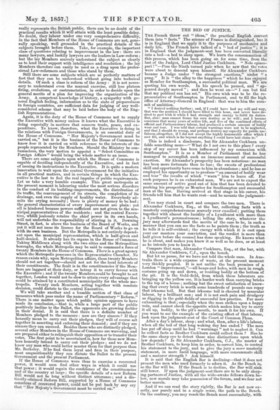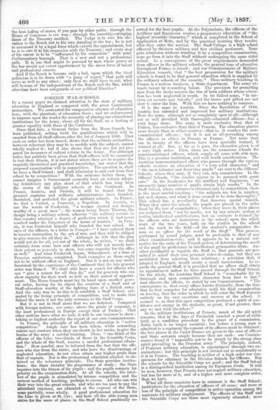THE BED OF JUSTICE.
THE French throw out "ideas," the practical English convert them into " fads." The science of France is distinguished, buc it is in England that we apply it to the purposes of mechanics and daily life. The French have talked of a bed of justice " ; it is in England that the judgment-seat has been converted literally into a bed—a bed to sleep upon. We learn the consummation of this process, which has been going on for some time, from the last of the Judges, Lord Chief Justice Cockburn. "Nob episcopari !"—Pius the Ninth turned pale when he saw that the votes were about to descend upon himself. Sir Alexander Cookburn became a Judge under the strongest emotions," under " a pang." It is "the alloy to the happiness" which he has enjoyed as Member for Southampton, a successful political man. We are quoting his own words. In his speech he paused, and "appeared deeply moved " ; and then he went on—" I can but feel that my political sun has set." His own wish was to be the representative of Southampton in Parliament, and to fill the high office of Attorney-General in England : that was to him the summit of ambition.
"I desired nothing further; and, if I could have had my will and way, that was the position I should have filled to this hour, and never have desired to part with it while I had strength and energy to fulfil its duties. But, alas ! man cannot frame his own destiny us he will ; and I became conscious that many years of active life, and two of the combined efforts of official and Parliamentary labour, had produced a certain amount of bodily wear and tear. I was told that certain warnings were not to be neglected, and that I should do wrong, and perhaps destroy my capacity for public usefulness altogether, if I did not accept the highly honourable office which I now fill, and which is far beyond anything I could have laid claim to."
This is indeed a disclosure, but Sir Alexander Cockburn unfolds something more—" What do I not owe to this place every step of my career has been influenced by my connexion with Southampton." It is as a Member of Parliament that he has managed to accomplish such an immense amount of successful exertion. Sir Alexander's prosperity has been notorious : no man has been more fortunate than he has ; the sweets of professional skill and opportunity have come to him in abundance; and he has so employed his opportunity as to produce " an amount of bodily wear and tear" the results of which " warn " him to leave off. For such purposes he is an exhausted man. We are not to expect the same amount of active good out of him that has been devoted to pushing his prosperity as Member for Southampton and suceessful man at the bar. Having arrived at that stage in his career, his friends tell him that he wants rest—and he mounts the judgmentseat.
You may stand in court and compare the two men. There is Alexander Cockburn, Esq., at the bar, collecting facts with a masterly comprehensiveness scarcely ever excelled ; putting them together with lamest the lucidity of a Lyndhurst with more than a I.,yndhurst's persuasiveness ; telling the story, whatever the jury may afterwards find the merits of the case to be in suoh a manner that you can see the facts as he paints them ; the truth as he tells it is self-evident; the energy with which it is east upon your ear masters your conviction and the verdict is more than half given before the counsel has done speaking. He knows what he is about, and makes you know it as well as he does, or at least as he intends you to know it. Compare that man, Alexander Cockburn, Esq., at the bar, with Sir Alexander Cockburn, C.J., upon the bench.
But let us pause, for we have not told the whole ease. In Australia there is a wide expanse of waste, at the present moment very thickly peopled. It is not unlike tho back premises of a London "improvement,"—all heaps and holes, with men in rough costume going up and down, or residing bodily at the bottom of the pit. It is the Gold-field, from which these labourers, are bringing up the yellow ore. It is harder work than carrying bricks to the top of a house; nothing but the sweet satisfaction of knowing that every brick is worth some hundreds of pounds can repay that irksome toil. But that irksome toil is cheered by muscular labour, by a brilliant sun; and it is not such pain and drudgery as digging in the gold-fields of successful law practice. Far more exhausting is that ; especially when the man strikes upon a happy vein, and cannot check the appetite which makes him try to carry it all up, bodily, to the pit's mouth, to mark it for his own. If you want to see the example of the existing effect of that labour, look upon the judgment-seat of the Court of Common Pleas. After a day's labour, sleep; and what, then, after a life's labour, when all the toil of that long waking. day has ended ? The man has put off sleep until he had " warnings ' not to neglect it. Can he collect facts as Brother Cockburn could collect them ? Has he the same sharp eye to detect those nice distinctions upon which law depends ? Is Sir Alexander Cockburn, C.J., the master of Brother Cockburn, to keep him in order, to correct him, to control his statement to the jury, and to give the jury a more masterly statement, in more lucid la e, with more consummate skill
and a maturer strength ? ;itself. It is said that the English Bar is declining—that it does not present the men who used formerly to adorn it. As the Bench is,
so the Bar will be. If the Bench is to decline, the Bar will sink still lower. If upon the judgment-seat there are to be only sleeping partners of Justice, with all the wide-awake fellows down below, new morals may take possession of the forum, and we fear not better morals.
And if we can read the story rightly, the Bar is not now exactly, nor purely and in a single sense, the path to the Bench. On the contrary, you may reach the Bench most successfully, with
the best lading of stores, if you pass by other paths: through the House of Commons is one way ; through the smoothly-swinging doors of the Treasury another. The Judge is to owe his elevation to the Bench not to his own standing at the bar • he is not to command it by a legal force which extorts the appointment, but he is to owe it to his connexion with the Treasury; and every step" of his career is to be "influenced by his connexion" with some Parliamentary borough. That is a new and not a professional path. It is one that might be pursued by men whose power at the bar would not extort appointment by the sheer force of talent and professional success.
And if the Bench is become only a bed, upon which the tired politician is to lie down with "a pang of regret," that path will serve as well as any other ; only then we shall have to ask, what will become of the independence of the Bench and the Bar, which aforetime have been safeguards of our political liberties ?



































 Previous page
Previous page